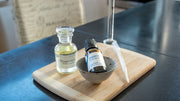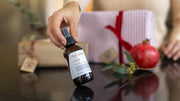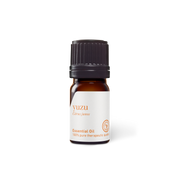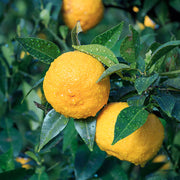Spring is just around the corner. If you're like us here at Aromatics, you can't wait! So what better way to get our collective vernal vibe on than to explore some of our favorite fruits and flowers? We'll start off this spring-evoking series of blogs with a special little fruit that creates a deliciously smelling essential oil that many of you probably have never heard of, but we think you should definitely get to know: Yuzu Oil.
What is Yuzu?
Yuzu (pronounced you-zoo) (Citrus junos) is a citrus fruit that hails from Japan. It looks like a small orange in appearance, but its taste is sour like that of a lemon. Its distinct aroma is similar to a grapefruit, with hints of mandarin, lime, and bergamot. Although it originated in China, yuzu has been used in Japan since ancient times. One such traditional use was to take a hot yuzu bath on the winter solstice. It was believed to ward off winter illnesses such as colds and even the flu. It must have been pretty effective because it is still widely practiced by the people of Japan today! Regardless of whether or not the winter solstice hot yuzu bath tradition, known as yuzuyu, actually works to ward off illnesses for the entire winter or not, yuzu still has some pretty amazing therapeutic benefits, especially if you use it more than just one day a year. (You can also use yuzu essential oil in other ways, as well!)
Amazing Things Yuzu May Do For You:
- Emotionally calming and uplifting
- Helps to clear infections
- Soothes sore muscles, relieving inflammation
- Increases circulation
- Supports healthy respiratory function discouraging the occasional overactive mucous production
- Supports healthy digestion
- May help ease occasional nausea
- Boosts immune health
- Inspires creativity - opens left brain
Yuzu essential oil has a typical 68-80% of the monoterpene (d) limonene which gives this essential oil its wonderful benefits (among others) of pain relieving, anti-inflammatory, antibacterial, immunostimulant, and skin penetration enhancer properties. The 7-11 percent of γ-terpinene enhances the properties of antibacterial, antioxidant, antispasmodic, and antiviral benefits.
How To Use Yuzu Oil
Yuzu is such a versatile essential oil, it can be used a number of ways to help with a variety of things.
- Add Yuzu essential oil to an inhaler blend to help you relax
- Combine it with bath salt for your own version of the yuzuyu (or even shower gel for those of you that prefer showers!)
- Make a belly oil with yuzy oil to aid digestion
- Add yuzu to a diffuser to help soothe respiratory ailments.
Yuzu Safety Precautions
Yuzu oil may cause skin irritation. Use in low dilution (1%, 5-6 drops per ounce of carrier) when applying to the skin, such as in bath or massage oils. Older, oxidized oils increase the potential for skin irritation. It's best to buy citrus oils that are from organically grown fruit as citrus trees can be heavily sprayed. Yuzu is not known for photosensitivity due to the low or non-existent levels of the chemical component bergamoten.
3 DIY Recipes Featuring Yuzu Oil
To get you started, here are three of our favorite recipes containing yuzu oil!








